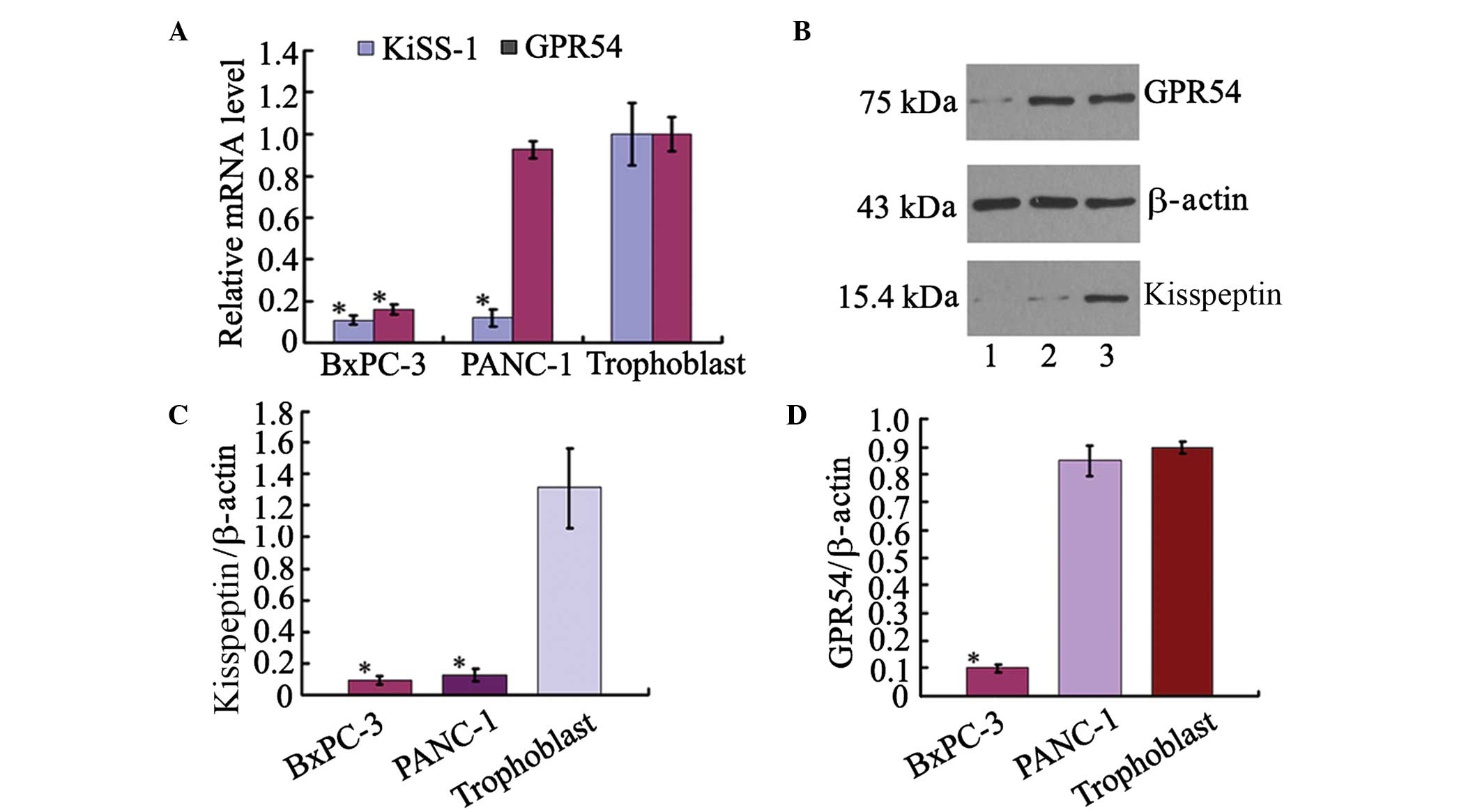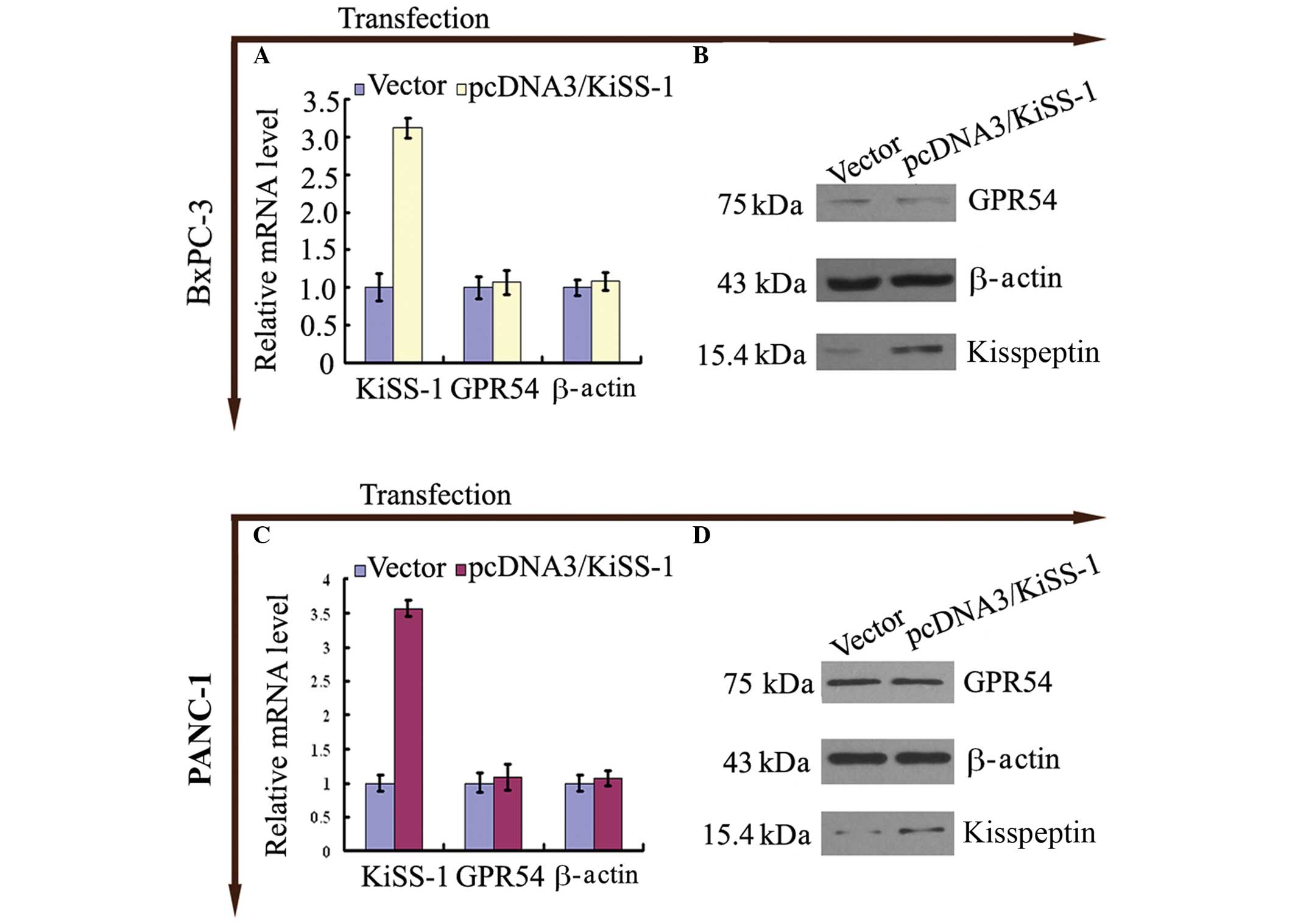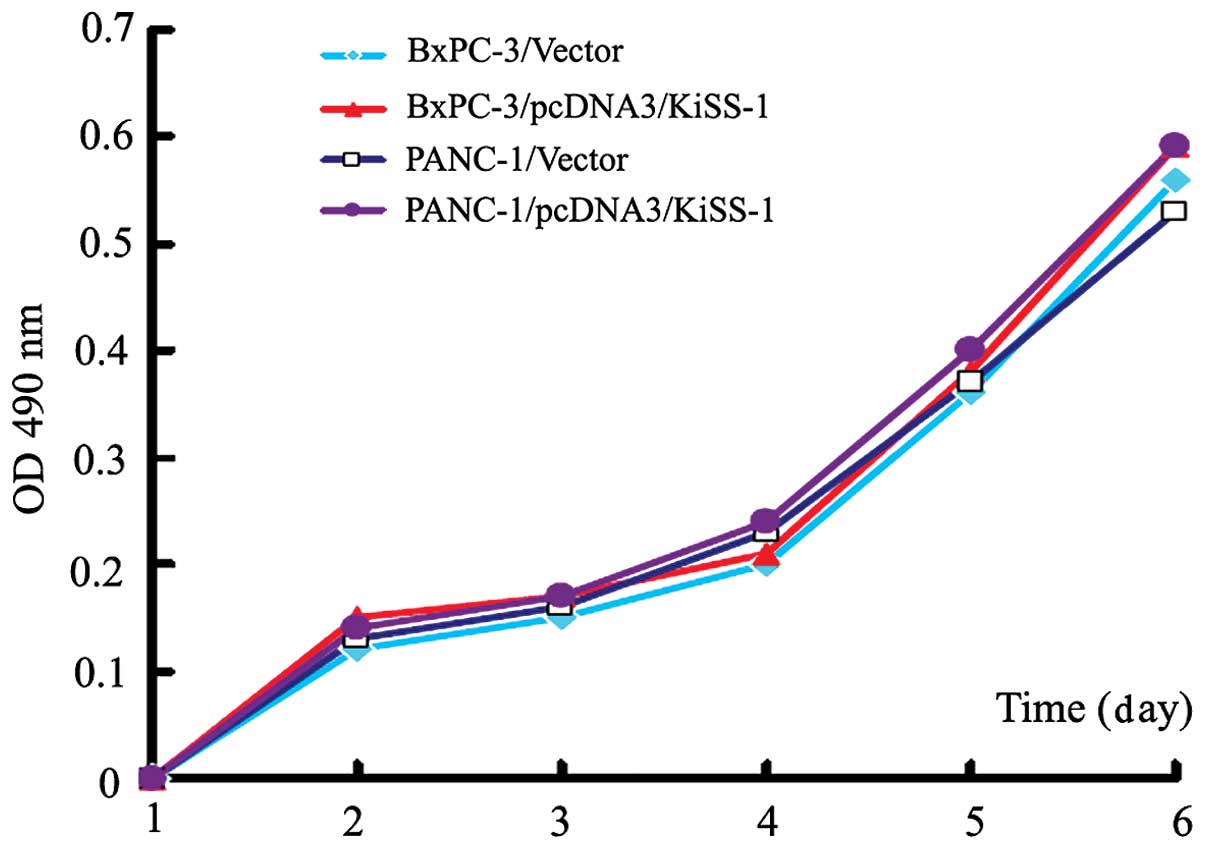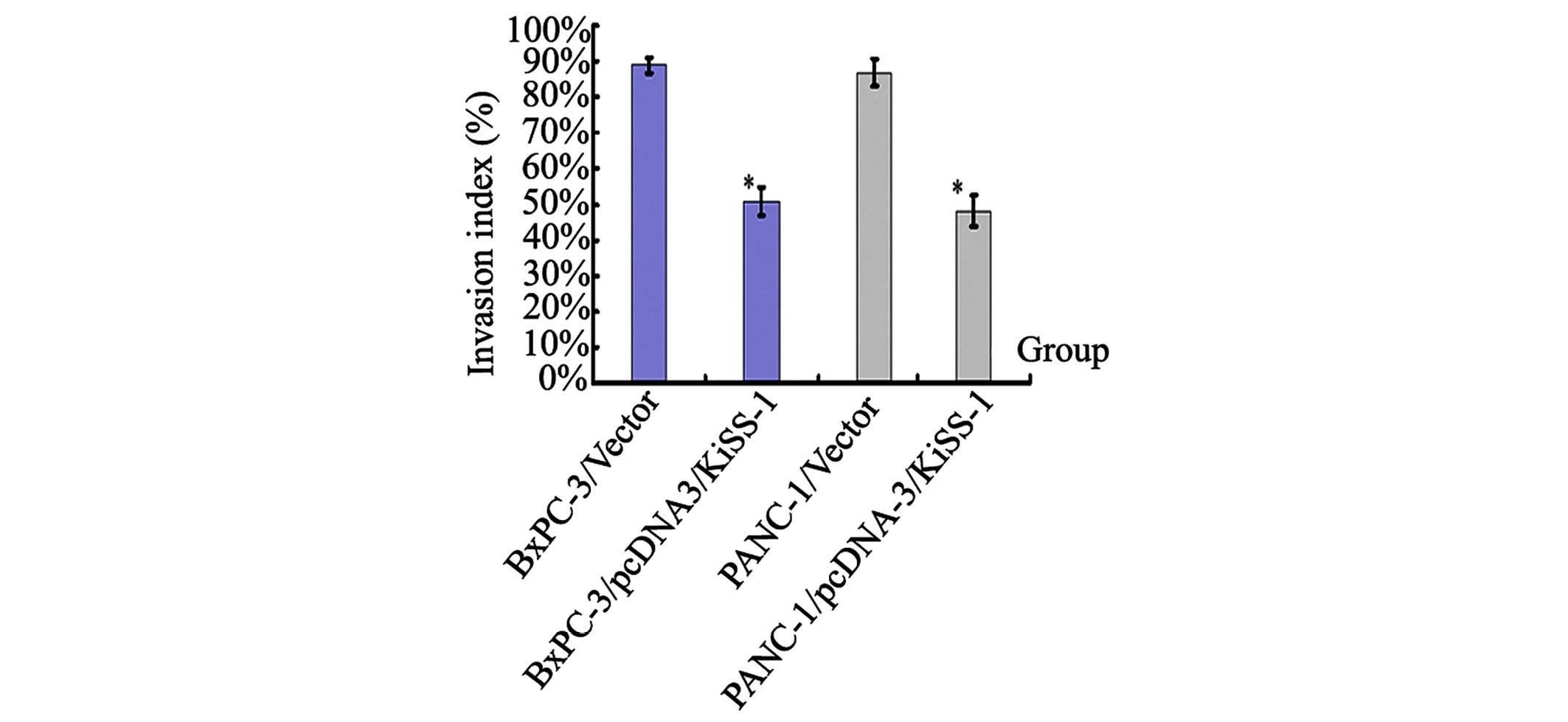|
1
|
Siegel R, DeSantis C, Virgo K, Stein K,
Mariotto A, Smith T, Cooper D, Gansler T, Lerro C, Fedewa S, et al:
Cancer treatment and survivorship statistics, 2012. CA Cancer J
Clin. 62:220–241. 2012. View Article : Google Scholar : PubMed/NCBI
|
|
2
|
National Cancer Institute: Cancer
statistics: SEER stat fact sheets: Pancreas cancer. http://seer.cancer.gov/statfacts/html/pancreas.html.
Accessed July 1, 2014.
|
|
3
|
Shaib Y, Davila J, Naumann C, et al: The
impact of curative intent surgery on the survival of pancreatic
cancer patients: a U.S. population-based study. Am J Gastroenterol.
102:1377–1382. 2007. View Article : Google Scholar : PubMed/NCBI
|
|
4
|
Kwon D, McFarland K, Velanovich V and
Martin RC II: Borderline and locally advanced pancreatic
adenocarcinoma margin accentuation with intraoperative irreversible
electroporation. Surgery. 156:910–920. 2014. View Article : Google Scholar : PubMed/NCBI
|
|
5
|
Tuveson DA and Neoptolemos JP:
Understanding metastasis in pancreatic cancer: A call for new
clinical approaches. Cell. 148:21–23. 2012. View Article : Google Scholar : PubMed/NCBI
|
|
6
|
Jemal A, Bray F, Center MM, Ferlay J, Ward
E and Forman D: Global cancer statistics. CA Cancer J Clin.
61:69–90. 2011. View Article : Google Scholar : PubMed/NCBI
|
|
7
|
Zakharova OP, Karmazanovsky GG and Egorov
VI: Pancreatic adenocarcinoma: Outstanding problems. World J
Gastrointest Surg. 4:104–113. 2012. View Article : Google Scholar : PubMed/NCBI
|
|
8
|
Wang C, Qiao C, Ma S, Zhou W and Dai X:
Expression of KiSS-1 in human pancreatic cancer and relationship
with their invasion and metastasis. China J Mod Med. 15:1620–1623.
16312005.
|
|
9
|
Makri A, Pissimissis N, Lembessis P,
Polychronakos C and Koutsilieris M: The kisspeptin (KiSS-1)/GPR54
system in cancer biology. Cancer Treat Rev. 34:682–692. 2008.
View Article : Google Scholar : PubMed/NCBI
|
|
10
|
Wang C, Qiao C and Dai X: Expression of
KiSS-1 in human pancreatic cancer and its clinical significance.
Chin J Cancer Prev Treat. 13:207–215. 2006.
|
|
11
|
Ji K, Ye L, Mason MD and Jiang WG: The
Kiss-1/Kiss-1R complex as a negative regulator of cell motility and
cancer metastasis (Review). Int J Mol Med. 32:747–754.
2013.PubMed/NCBI
|
|
12
|
Masui T, Doi R, Mori T, Toyoda E, Koizumi
M, Kami K, Ito D, Peiper SC, Broach JR, Oishi S, et al: Metastin
and its variant forms suppress migration of pancreatic cancer
cells. Biochem Biophys Res Commun. 315:85–92. 2004. View Article : Google Scholar : PubMed/NCBI
|
|
13
|
Szereszewski JM, Pampillo M, Ahow MR,
Offermanns S, Bhattacharya M and Babwah AV: GPR54 regulates ERK1/2
activity and hypothalamic gene expression in a Gα(q/11) and
β-arrestin-dependent manner. PLoS One. 5:e129642010. View Article : Google Scholar
|
|
14
|
Francis VA, Abera AB, Matjila M, Millar RP
and Katz AA: Kisspeptin regulation of genes involved in cell
invasion and angiogenesis in first trimester human trophoblast
cells. PLoS One. 9:e996802014. View Article : Google Scholar : PubMed/NCBI
|
|
15
|
Wang C, Qiao C and Dai X: Cloning of human
KiSS-1 gene and construction of its eukaryotic expression vector. J
Clin Med Univ. 34:218–219. 2005.In Chinese.
|
|
16
|
Li N, Wang HX, Zhang J, Ye YP and He GY:
KISS-1 inhibits the proliferation and invasion of gastric carcinoma
cells. World J Gastroenterol. 18:1827–1833. 2012. View Article : Google Scholar : PubMed/NCBI
|
|
17
|
Qiao C, Wang CH, Shang T and Lin QD:
Clinical significance of KiSS-1 and matrix metalloproteinase-9
expression in trophoblasts of women with preeclampsia and their
relation to perinatal outcome of neonates. Zhonghua Fu Chan Ke Za
Zhi. 40:585–590. 2005.In Chinese. PubMed/NCBI
|
|
18
|
Qiao C, Wang C, Zhao J, Liu C and Shang T:
Elevated expression of KiSS-1 in placenta of Chinese women with
early-onset preeclampsia. PLoS One. 7:e489372012. View Article : Google Scholar : PubMed/NCBI
|
|
19
|
Boyle J, Czito B, Willett C and Palta M:
Adjuvant radiation therapy for pancreatic cancer: A review of the
old and the new. J Gastrointest Oncol. 6:436–444. 2015.PubMed/NCBI
|
|
20
|
Sinn M, Striefler JK, Sinn BV, Sallmon D,
Bischoff S, Stieler JM, Pelzer U, Bahra M, Neuhaus P, Dörken B, et
al: Does long-term survival in patients with pancreatic cancer
really exist? Results from the CONKO-001 study. J Surg Oncol.
108:398–402. 2013. View Article : Google Scholar : PubMed/NCBI
|
|
21
|
Muir AI, Chamberlain L, Elshourbagy NA,
Michalovich D, Moore DJ, Calamari A, Szekeres PG, Sarau HM,
Chambers JK, Murdock P, et al: AXOR12, a novel human G
protein-coupled receptor, activated by the peptide KiSS-1. J Biol
Chem. 276:28969–28975. 2001. View Article : Google Scholar : PubMed/NCBI
|
|
22
|
Ohtaki T, Shintani Y, Honda S, Matsumoto
H, Hori A, Kanehashi K, Terao Y, Kumano S, Takatsu Y, Masuda Y, et
al: Metastasis suppressor gene KiSS-1 encodes peptide ligand of a
G-protein-coupled receptor. Nature. 411:613–617. 2001. View Article : Google Scholar : PubMed/NCBI
|
|
23
|
Lee JH, Miele ME, Hicks DJ, Phillips KK,
Trent JM, Weissman BE and Welch DR: KiSS-1, a novel human malignant
melanoma metastasis-suppressor gene. J Natl Cancer Inst.
88:1731–1737. 1996. View Article : Google Scholar : PubMed/NCBI
|
|
24
|
Nagai K, Doi R, Katagiri F, Ito T, Kida A,
Koizumi M, Masui T, Kawaguchi Y, Tomita K, Oishi S, et al:
Prognostic value of metastin expression in human pancreatic cancer.
J Exp Clin Cancer Res. 28:92009. View Article : Google Scholar : PubMed/NCBI
|
|
25
|
Lee JH and Welch DR: Suppression of
metastasis in human breast carcinoma MDA-MB-435 cells after
transfection with the metastasis suppressor gene, KiSS-1. Cancer
Res. 57:2384–2387. 1997.PubMed/NCBI
|
|
26
|
Shirasaki F, Takata M, Hatta N and
Takehara K: Loss of expression of the metastasis suppressor gene
KiSS1 during melanoma progression and its association with LOH of
chromosome 6q16.3-q23. Cancer Res. 61:7422–7425. 2001.PubMed/NCBI
|
|
27
|
Jiang Y, Berk M, Singh LS, Tan H, Yin L,
Powell CT and Xu Y: KiSS1 suppresses metastasis in human ovarian
cancer via inhibition of protein kinase C alpha. Clin Exp
Metastasis. 22:369–376. 2005. View Article : Google Scholar : PubMed/NCBI
|
|
28
|
Nash KT, Phadke PA, Navenot JM, Hurst DR,
Accavitti-Loper MA, Sztul E, Vaidya KS, Frost AR, Kappes JC, Peiper
SC, et al: Requirement of KISS1 secretion for multiple organ
metastasis suppression and maintenance of tumor dormancy. J Natl
Cancer Inst. 99:309–321. 2007. View Article : Google Scholar : PubMed/NCBI
|
|
29
|
McNally LR, Welch DR, Beck BH, Stafford
LJ, Long JW, Sellers JC, Huang ZQ, Grizzle WE, Stockard CR, Nash
KT, et al: KISS1 over-expression suppresses metastasis of
pancreatic adenocarcinoma in a xenograft mouse model. Clin Exp
Metastasis. 27:591–600. 2010. View Article : Google Scholar : PubMed/NCBI
|
|
30
|
Re RN: The origins of intracrine hormone
action. Am J Med Sci. 323:43–48. 2002. View Article : Google Scholar : PubMed/NCBI
|
|
31
|
Gortz A, Nibbs RJ, McLean P, Jarmin D,
Lambie W, Baird JW and Graham GJ: The chemokine ESkine/CCL27
displays novel modes of intracrine and paracrine function. J
Immunol. 169:1387–1394. 2002. View Article : Google Scholar : PubMed/NCBI
|
|
32
|
Leung PS: The physiology of a local
renin-angiotensin system in the pancreas. J Physiol. 580:31–37.
2007. View Article : Google Scholar : PubMed/NCBI
|
|
33
|
Lau ST and Leung PS: Role of the RAS in
pancreatic cancer. Curr Cancer Drug Targets. 11:412–420. 2011.
View Article : Google Scholar : PubMed/NCBI
|
|
34
|
Yan C, Wang H and Boyd DD: KiSS-1
represses 92-kDa type IV collagenase expression by down-regulating
NF-kappaB binding to the promoter as a consequence of Ikappa Balpha
-induced block of p65/p50 nuclear translocation. J Biol Chem.
276:1164–1172. 2001. View Article : Google Scholar
|


















